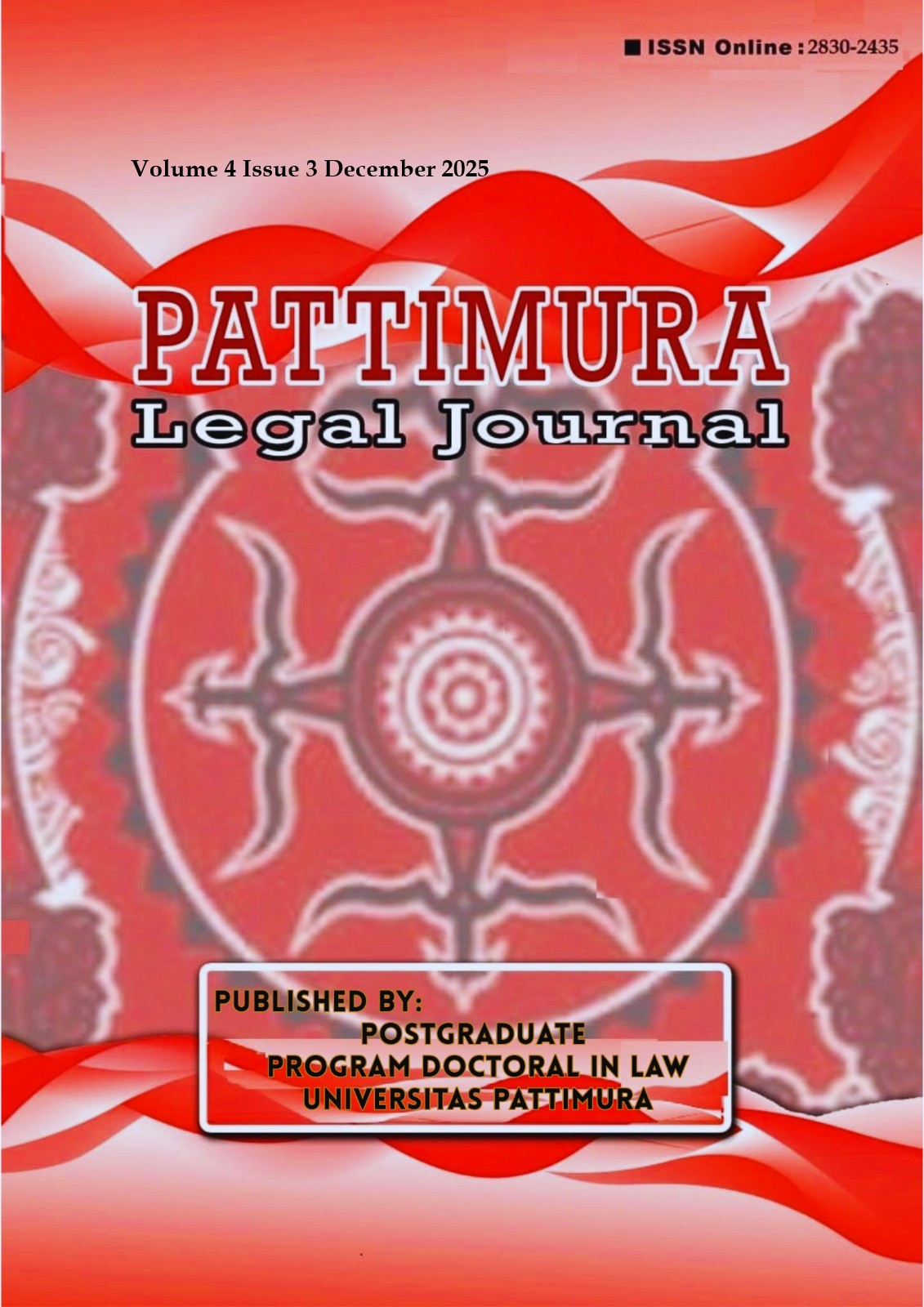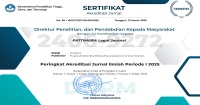Political Interests Versus the Supremacy of Law: A Critical Review of Constitutional Law Regarding the Abolition of Tom Lembong and Amnesty for Hasto Kristiyanto
Abstract
Introduction: The President's authority to grant amnesty and abolition is a constitutional prerogative that provides flexibility in resolving legal issues with political and social implications, such as reconciliation and conflict resolution.
Purposes of the Research: This research aims to provide a critical analysis regarding the granting of amnesty to Hasto Kristiyanto and the abolition granted to Tom Lembong from the perspective of constitutional law.
Methods of the Research: This research is a normative legal study with a conceptual and legislative approach.
Results Main Findings of the Research: The constitutional authority of the President to grant amnesty and abolition is a prerogative right that provides flexibility and special power to resolve legal issues related to political and social dimensions, such as reconciliation and conflict resolution. The case of granting amnesty to Hasto Kristiyanto and abolition to Tom Lembong has sparked a debate about the balance between the supremacy of law and political interests, where the decision has the potential to mature the subordination of law to political interests, thus demanding transparency and accountability so that the President's prerogative is not misused for short-term political gain. Therefore, a checks and balances mechanism involving the House of Representatives and high transparency must be implemented so that the President's authority can be exercised in an accountable manner and in favor of the people's interests as a whole.
Downloads
References
Ahmad, Ahmad. “Purifikasi Pemberian Amnesti Dan Abolisi: Suatu Ikhtiar Penyempurnaan Undang Undang Dasar 1945.” Ius Civile: Refleksi Penegakan Hukum Dan Keadilan 5, no. 2 (2021): 93–99. https://doi.org/10.35308/jic.v5i2.2547.
Alnemari, Hazim. “God’s Law, King’s Court: Ḥudūd Jurisprudence under Saudi Monarchical Decrees.” Journal of Islamic Law 6, no. 1 (2025): 3–8. https://doi.org/10.53484/jil.v6.alnemari.
Bryan A. Garner, Henry Campbell Black. Black’s Law Dictionary. 11th ed. Minnesotta: West Publishing Co, St. Paull, 2019.
Christiano, Thomas, and Andrew Williams. “Symposium on Tommie Shelby’s The Idea of Prison Abolition.” Politics, Philosophy & Economics 24, no. 3 (2025): 215–16. https://doi.org/10.1177/1470594X251337222.
Essien, Joseph Paul, Maduka Enyimba, and Thomas Egaga Ushie. “The Abolition of Death Penalty and Crime Control in Nigeria.” The International Journal of Human Rights 1, no. 1 (2025): 1–12. https://doi.org/10.1080/13642987.2025.2533989.
Haritjahjono, Budi, and Sodikin Sodikin. “Implementation of the Lex Certa Principle towards the Ambiguity of Digital Law’s in Indonesia.” Amnesti: Jurnal Hukum 7, no. 1 (2025): 1–14. https://doi.org/10.37729/amnesti.v7i1.5873.
Holder, Robyn L., and Albin Dearing. “Human Dignity, Rights and Victim Participation in Criminal Justice.” International Criminology 4, no. 1 (2024): 108–19. https://doi.org/10.1007/s43576-024-00119-3.
Idayanti, Soesi, Toni Haryadi, and Tiyas Vika Widyastuti. “Penegakan Supremasi Hukum Melalui Implementasi Nilai Demokrasi.” Diktum : Jurnal Ilmu Hukum 8, no. 1 (2020): 83–93. https://doi.org/10.24905/diktum.v8i1.85.
Isnawati, Isnawati, Adam Setiawan, Fatma Hidayati, and Rezky Robiatul Aisyiah Ismail. “The Indonesian President’s Prerogative Rights In The Appointment of Ministers After The Amendment to The 1945 Constitution.” PADJADJARAN Jurnal Ilmu Hukum (Journal of Law) 10, no. 2 (2023): 254–74. https://doi.org/10.22304/pjih.v10n2.a6.
Kanantha, Adiel Muhammad, and Ferry Edwar. “Independensi Pengadilan Pajak Ditinjau Dari Pasal 24 Ayat (1) UUD NRI 1945.” Reformasi Hukum Trisakti 4, no. 3 (2022): 519–28. https://doi.org/10.25105/refor.v4i3.13828.
Lailam, Tanto, and Nita Andrianti. “Legal Policy of Constitutional Complaints in Judicial Review: A Comparison of Germany, Austria, Hungary, and Indonesia.” Bestuur 11, no. 1 (2023): 75–94. https://doi.org/10.20961/bestuur.v11i1.70052.
Lenta, Patrick. “Amnesties, Transitional Justice and the Rule of Law.” Hague Journal on the Rule of Law 15, no. 3 (2023): 441–69. https://doi.org/10.1007/s40803-023-00199-9.
Maulan, Rikiandi Sopian, Chrisdianto eko Purnomo, Haeruman Jayadi, and Rachman Maulana Kafrawi. “Urgensi Pembentukan Undang-Undang Grasi,Amnesti, Abolisi Dan Rehabilitasi Ditinjau Dari Kepastian Hukum.” Jurnal Diskresi 3, no. 1 (2024): 52–59.
McCarter, Susan, Gilbert Singletary, and Destiny Reyes. “Abolish or Reform Criminal Justice in the United States? A Forensic Social Work Perspective.” Journal of Forensic Social Work 9, no. 1 (2025): 4–21. https://doi.org/10.15763/issn.1936-9298.2025.9.1.4-21.
Mukhlis, Muhammad Mutawalli, Harlida Abdul Wahab, Zulhilmi Paidi, Nila Sastrawaty, and Haslinda Hasan. “Heavy Parliamentary v. Heavy Executive: Ambiguity of Power in Indonesian Constitutional Practices.” Jurnal Media Hukum 31, no. 2 (2024): 186–205. https://doi.org/10.18196/jmh.v31i2.21703.
Nasution, Liantha Adam, Fatimah Islamy Nasution, Siti Aminah, and Zulfahmi Zulfahmi. “Pardon for Corruptors: An Examination of Repentance and Restitution in Islamic Criminal Law.” JUSTISI 11, no. 3 (2025): 719–31. https://doi.org/10.33506/js.v11i3.4365.
Novak, Andrew. “Contesting the Royal Prerogative of Mercy: The Queen’s Pardons and the 1968 Constitutional Crisis over the Death Penalty in Rhodesia.” The Journal of Imperial and Commonwealth History 53, no. 1 (2025): 82–106. https://doi.org/10.1080/03086534.2025.2460092.
Padilla, Javier. “Is Satisfaction with Democracy Higher After Transitional Justice Trials?” Political Behavior 1, no. 1 (2025): 2–7. https://doi.org/10.1007/s11109-025-10007-9.
Parasher, Tejas. “Federalism, Representation, and Direct Democracy in 1920s India.” Modern Intellectual History 19, no. 2 (2022): 444–72. https://doi.org/10.1017/S1479244320000578.
Prasetio, Dicky Eko, Muh. Ali Masnun, and Noviyanti Noviyanti. “Post-Election Reconciliation in 2024 as a Constitutional Convention in Indonesia: A Progressive Legal Culture Perspective.” Jambura Law Review 7, no. 1 (2025): 176–96. https://doi.org/10.33756/jlr.v7i1.26999.
Ramadani, Rizky Malinto, Indra Perwira, and Bilal Dewansyah. “Problem Pemberian Amnesti Oleh Presiden Dalam Perspektif Kepentingan Negara.” Jurnal Ilmiah Universitas Batanghari Jambi 21, no. 3 (2021): 984. https://doi.org/10.33087/jiubj.v21i3.1688.
Ramdhani, Nadia Marsya, Khoirunnisa Putri Diksy, and Kirana Amelia Sitanggang, Daniella. “The Effectiveness of The Death Penalty In Indonesia Through A Human Rights Perspective (A Comparative Study Of The Application Of The Death Penalty With Australia ).” Journal of Ius Comparatum Law Studies 1, no. 1 (2025): 1–11.
Rohmatul Jannah, Dyah Hayu, Ersy Aulia, Lois Salwa, Fathan Akbar, and Kuswan Hadji. “Analisis Hukum Kedudukan Lembaga Negara Berdasarkan UUD 1945 Dalam Sistem Ketatanegaraan Indonesia.” Hukum Inovatif : Jurnal Ilmu Hukum Sosial Dan Humaniora 1, no. 3 (2024): 65–78. https://doi.org/10.62383/humif.v1i3.291.
Safriani, Andi. “Due Process Of Law Dalam Pembubaran Organisasi Masyarakat Tanpa Melalui Proses Pengadilan.” Alauddin Law Development Journal (ALDEV) 4, no. 2 (2022): 277–93.
Sales, Philip. “Constitutional Values In The Common Law Of Obligations.” The Cambridge Law Journal 83, no. 1 (2024): 132–57. https://doi.org/10.1017/S0008197324000011.
Strange, Carolyn, Daniel Pascoe, and Andrew Novak. “The Politics of Abolition: Reframing the Death Penalty’s History in Comparative Perspective.” Punishment & Society 27, no. 3 (2025): 486–505. https://doi.org/10.1177/14624745241298220.
Sundar, Nandini. “‘We Will Teach India Democracy’: Indigenous Voices in Constitution Making.” Journal of Imperial and Commonwealth History 1, no. 1 (2023): 1–33. https://doi.org/10.1080/03086534.2023.2196838.
Tempo.co. “Pro-Kontra Amnesti Dan Abolisi Untuk Kasus Korupsi,” 2025. https://www.tempo.co/hukum/pro-kontra-amnesti-dan-abolisi-untuk-kasus-korupsi--2055449.
———. “Sukarno Hingga Prabowo Pernah Keluarkan Abolisi Dan Amnesti,” 2025. https://www.tempo.co/politik/sukarno-hingga-prabowo-pernah-keluarkan-abolisi-dan-amnesti-2054461.
Wenzelburger, Georg. “Policy Windows and Criminal Justice Reforms: A Multiple Streams Framework Analysis.” Policy & Politics 53, no. 2 (2025): 296–314. https://doi.org/10.1332/03055736Y2024D000000060.
Widodo, Hananto, Dicky Eko Prasetio, and Fradhana Putra Disantara. “Relasi Kekuasaan Antar Presiden Dan Wakil Presiden Dalam Sistem Ketatanegaraan Republik Indonesia.” Pandecta Research Law Journal 15, no. 1 (2020): 13–25. https://doi.org/10.15294/pandecta.v15i1.24554.
Wijaya, Nasri. “Analysis of Abolition Opportunities for Johenas Gluba Gebze in Indonesian Legal Perspective.” Papsel Law Journal 1, no. 1 (2024): 21–25.
Wolf, Loammi. “The Disqualification of Candidates for Election: MK Political Party v Independent Electoral Commission.” South African Journal on Human Rights 1, no. 1 (2025): 1–14. https://doi.org/10.1080/02587203.2025.2455069.
Yanuarto, Totok, Pika Sari, I Gede Widihiana Suarda, and Ainul Azizah. “Pengintegrasian Mediasi Penal Sebagai Penyelesaian Perkara Pidana Ditinjau Dari Perspektif Pembaharuan Hukum Di Indonesia.” Jurnal Rechtens 13, no. 1 (2024): 149–65. https://doi.org/10.56013/rechtens.v13i1.2845.
Yusvitasar, Devi. “Penerapan Prinsip Persona Non Grata Terhadap Duta Besar Ditinjau Dari Perspektif Hukum Internasional (Studi Kasus Penganiayaan TKI Oleh Duta Besar Arab Saudi Di Jerman).” Ganesha Civic Education Journal 1, no. 1 (2019): 60–71.
Copyright (c) 2025 Fakhry Amin, Souad Ahmed Ezzerouali (Author)

This work is licensed under a Creative Commons Attribution-NonCommercial 4.0 International License.
Authors who publish their manuscripts in this Journal agree to the following conditions:
- The copyright in each article belongs to the author, as well as the right to patent.
- Authors are able to enter into separate, additional contractual arrangements for the non-exclusive distribution of the journal's published version of the work (e.g., post it to an institutional repository or publish it in a book), with an acknowledgment of its initial publication in this journal.
- Authors are permitted and encouraged to post their work online (e.g., in institutional repositories or on their website) prior to and during the submission process, as it can lead to productive exchanges, as well as earlier and greater citation of published work.
- Authors have the right to self-archiving of the article (Author Self-Archiving Policy)






















